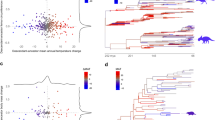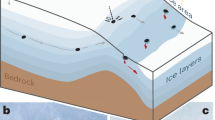Abstract
Fejer1 and Scott2 have given simple methods for estimating the remaining life-time of an artificial Earth satellite. Their methods do not apply when the eccentricity is small, and it is not immediately clear why the estimates are so good (cf. particularly Scott's data for the descent of the rocket of 1957 Alpha Satellite). Nevertheless, it has been found possible to show that their formulæ are accurate so long as the eccentricity is not too large.
This is a preview of subscription content, access via your institution
Access options
Subscribe to this journal
Receive 51 print issues and online access
$199.00 per year
only $3.90 per issue
Buy this article
- Purchase on Springer Link
- Instant access to full article PDF
Prices may be subject to local taxes which are calculated during checkout
Similar content being viewed by others
References
Fejer, J. A., Nature, 180, 1413 (1957).
Scott, J. M. C., Nature, 180, 1467 (1957).
Author information
Authors and Affiliations
Rights and permissions
About this article
Cite this article
LESLIE, D. Life-time of an Artificial Earth Satellite. Nature 181, 403–404 (1958). https://doi.org/10.1038/181403a0
Issue Date:
DOI: https://doi.org/10.1038/181403a0
This article is cited by
-
Predicting the Life-Times of Artificial Satellites in Theory and Practice
Nature (1962)
-
Calculation of the Life-time of a Satellite
Nature (1958)
-
Effect of the Earth's Equatorial Bulge on the Life-time of Artificial Satellites and its use in determining Atmospheric Scale-Heights
Nature (1958)
-
Effect of Air Drag on the Orbit of the Russian Earth Satellite 1957β: Comparison of Theory and Observation
Nature (1958)
Comments
By submitting a comment you agree to abide by our Terms and Community Guidelines. If you find something abusive or that does not comply with our terms or guidelines please flag it as inappropriate.



